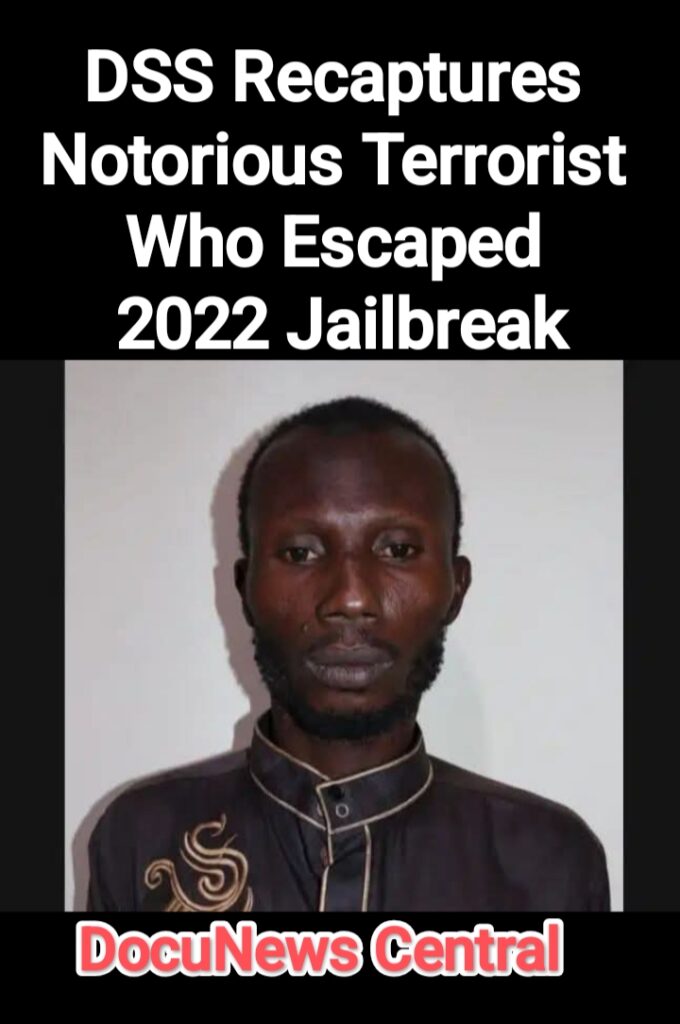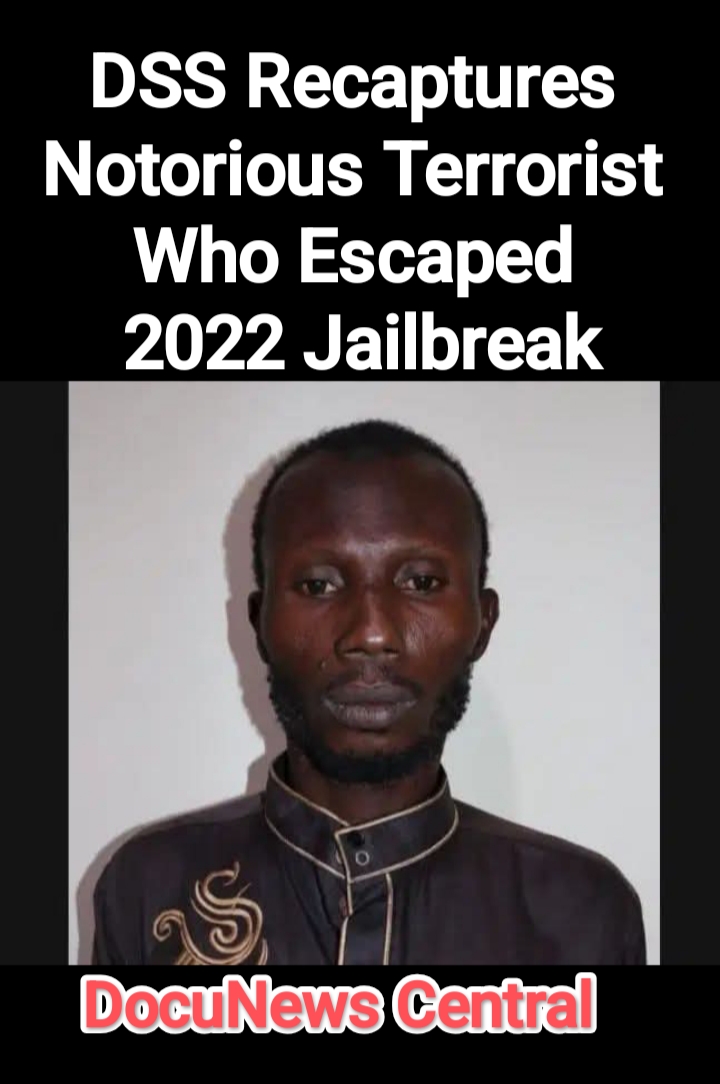
In a significant victory for Nigeria’s national security apparatus, the Department of State Services (DSS) has recaptured a high-profile terrorist, Abdulazeez Obadaki, who escaped custody during the dramatic 2022 Kuje prison break. The operation marks a major turning point in the fight against insurgency and terror financing in the country.
Background: The 2022 Kuje Prison Break
To appreciate the import of this recapture, it helps to revisit how Obadaki made his escape. On July 5, 2022, Kuje Medium Security Custodial Centre in Abuja came under a coordinated and well-armed assault. The attackers, believed to be linked to Islamic extremist groups, struck with small arms and explosives, overwhelming the prison’s defenses.
The jailbreak resulted in the escape of 879 inmates, including high-value terror suspects. Although a portion of the escapees were recaptured shortly afterward, many remain unaccounted for. The jailbreak was widely condemned. Investigations traced links back to Ansaru — an Al‑Qaeda–affiliated group — which intelligence later revealed had a hand in orchestrating the entire operation.
Who Is Abdulazeez Obadaki?
Abdulazeez Obadaki had been held in Kuje prison prior to the attack. According to DSS sources, he was not just any inmate: he had been accused of masterminding bank attacks in Uromi, Edo State, as well as a fatal shooting at the Deeper Life College in Okene, Kogi State — both in 2022. Read more on DSS operations against terror suspects.
Importantly, Obadaki is allegedly a member of Ansaru, a terror organization with deep roots in Nigeria’s insurgency landscape and connections to global jihadist networks. His recapture removes a dangerous operative from the field and potentially yields rich intelligence about Ansaru’s network, plans, and resources.
The Recapture Operation
According to an unnamed source familiar with the DSS’s counterterrorism operations, Obadaki was apprehended in a smart, intelligence-driven operation. The details of where or how the arrest was made have not been made public, presumably to protect ongoing operations, but DSS confirmed that the arrest took place on a Friday morning.
It is likely that various security stakeholders — including military units, intelligence agencies, and other law enforcement organs — collaborated in this operation. Given the complexity and risk associated with recapturing a fugitive who’s been on the run for years, the DSS would have needed precise intelligence, operational planning, and execution.
Why This Matters
1. Blow to Ansaru
Obadaki’s capture represents a major blow to Ansaru’s operational capability. Leaders and operatives like him are not only tactical assets but also symbolic ones; their capture weakens the group’s morale and disrupts its command structure.
2. Intelligence Windfall
Getting Obadaki back into custody opens up critical intelligence possibilities. Interrogation and debriefing could reveal how Ansaru planned and executed the Kuje prison break, who funded or supported it, and which sleeper cells remain active in Nigeria and beyond.
3. Deterrence
The daring 2022 jailbreak was an embarrassment for Nigerian security agencies. Recapturing a fugitive from that episode sends a message: the DSS is not just reactive but capable of thoughtful, patient, and sustained pursuit. It signals that escapees should not assume they are safe simply because they got out.
4. Public Confidence
For a population weary of terror attacks, this arrest can bolster public confidence in the DSS and Nigeria’s broader security strategy. It reassures citizens that security agencies are making headway in their fight against extremism.
5. Legal and Judicial Follow-through
Obadaki will likely face terrorism-related charges, and his recapture strengthens the state’s case. Already, the DSS has filed terrorism charges against other Ansaru leaders — including their so-called Emir, Mahmud Usman, and his deputy, Mahmud al-Nigeri. See related DSS legal action.
Broader Context: Ansaru and Nigeria’s Terror Landscape
Ansaru is one of the lesser-known yet dangerous jihadist groups operating in Nigeria. It has ties to international extremist organizations and has been linked to high-profile kidnappings and robberies. In September 2025, the DSS formally filed terrorism charges against two senior Ansaru commanders: Mahmud Usman (aka “Abu Bara’a”), described as the self-styled Emir, and his deputy, Mahmud al‑Nigeri (Malam Mamuda). Both men are believed to have played significant roles in the 2022 Kuje prison break and have long been on Nigeria’s most-wanted list.
Risks and Challenges Ahead
- Prison Security: The Kuje jailbreak exposed glaring vulnerabilities in Nigeria’s prison infrastructure. If these weaknesses are not addressed, other high-risk inmates might exploit them again.
- Judicial Bottlenecks: Terrorism trials are complex and often prolonged. For the DSS to maintain momentum, prosecutors must build airtight cases, and the courts must be ready to handle them efficiently.
- Retaliation: With Obadaki back in custody, Ansaru may seek vengeance or attempt to free him or other high-profile figures. The DSS and other security agencies must remain alert to such risks.
- Intelligence Exploitation: The value of Obadaki lies largely in what he knows. The DSS must handle debriefing carefully, balancing intelligence extraction with adherence to legal and human rights standards.
- Community Relations: As security forces clamp down, there is a risk of alienating local communities, especially if operations are heavy-handed. Winning hearts and minds will remain critical.
What This Means for Nigeria
Obadaki’s arrest is more than just a tactical success; it’s a strategic moment in Nigeria’s long war on terror. Several implications include:
- Reaffirming State Authority: By capturing a high-value escapee, the DSS reinforces the authority of the state.
- Strengthening Counterterrorism Partnerships: The successful operation likely involved coordination across multiple security agencies. Read more on joint DSS and military operations.
- Disrupting Funding Mechanisms: Terror groups like Ansaru often rely on kidnapping, armed robbery, and sleeper cells for funding. Dismantling leadership and capturing key operatives could choke off these revenue streams.
- Bolstering Legal Precedent: As more terrorists are tried under terrorism laws, Nigeria will build a stronger jurisprudence around counterterrorism prosecutions.
- Inspiring Further Operations: A win like this can galvanize the DSS and other security actors. It may boost morale within the agencies, encouraging more intelligence-led operations against terror cells.
A Word on the Human Cost
While the recapture is undoubtedly a strategic victory, it is essential not to overlook the human dimension. The 2022 Kuje prison break was a traumatic event — not just for security agencies but for the community around the prison. Gunfire, explosions, and the mass escape of inmates brought distress to local residents.
Moreover, many escapees are not mere numbers; they represent families, victims, and longer chains of violence. By recapturing Obadaki, the DSS potentially averts further bloodshed and disruption that could have come from him rejoining or leading terror operations.
Looking Forward
What comes next will be as critical as the arrest itself:
- Prosecution: The DSS must ensure that Obadaki faces comprehensive charges in court.
- Intelligence Exploitation: Authorities will likely debrief Obadaki intensively. Beyond interrogation, his capture should feed into a sustained intelligence campaign.
- Prison Reform: Authorities ought to audit prison security, invest in modernization, and strengthen contingency plans for future attacks.
- Community Engagement: Security operations must go hand in hand with efforts to rebuild trust. Communities near terror-affected regions should be involved in rehabilitation, deradicalization, and social reintegration programs.
- Policy Continuity: The government should sustain momentum, ensuring counterterrorism policies are robust, well-funded, and strategically aligned with long-term national security goals.
Conclusion
The recapture of Abdulazeez Obadaki is a milestone in Nigeria’s battle against extremist violence. It symbolizes not just the return of a dangerous individual to custody, but the resilience and reach of the DSS. Through intelligence-led work, operational precision, and legal follow-through, state security agencies are demonstrating that they can respond decisively to even the most brazen threats.
Yet, this success must not breed complacency. The risk remains — that other militants could exploit prison vulnerabilities, or that terror networks may seek to free their own. To guard against such scenarios, Nigeria must couple tactical wins with structural reforms, legal strength, and community-based approaches to counterterrorism.
If Obadaki’s recapture teaches us anything, it is that persistence and precision matter. For Nigeria’s security agencies, the path forward demands both: staying relentless in pursuit, but also wise in strategy. for more verified news like ours go to http://legit.com












